- Home
- Michael Swanwick
In the Drift
In the Drift Read online
EARLY BIRD BOOKS
FRESH EBOOK DEALS, DELIVERED DAILY
BE THE FIRST TO KNOW—
NEW DEALS HATCH EVERY DAY!
Praise for the Writing of Michael Swanwick
The Iron Dragon’s Daughter
A New York Times Notable Book
“Eerie … extraordinary … Dickens meets Detroit, full of grimy, toiling waifs, dark factories, trolls with boomboxes, and sleek, decadent high elves … Sordid, violent, funny, absurd, angry, by turns, as intense in its pleasures as in its pains … Swanwick takes huge risks here, and reaps big rewards.” —Locus
“Entertaining reading … Flamboyant … Grotesquely Dickensian.” —Newsday
In the Drift
“This episodic tale of life, war and survival in post-meltdown Pennsylvania builds a potent new myth from the reality of radioactive waste.” —George R. R. Martin
“Shocking … powerful.” —Daily News (New York)
“A powerful and affecting novel … Chilling, believable and uncomfortably close to home.” —The Evening Sun (Baltimore)
Bones of the Earth
“Jurassic Park set amid the paradox of time travel … I dare anyone to read the first chapter and not keep reading all the way through to the last shocking page.” —James Rollins, New York Times–bestselling author of Subterranean and Bone Labyrinth
“Swanwick dramatizes of the world of dinosaurs with great flair and knowledge, even love. Bones of the Earth dances on the edge of an abyss.… [An] entertaining and deft performance.” —The Philadelphia Inquirer
“Swanwick proves that sci-fi has plenty of room for wonder and literary values.” —San Francisco Chronicle
Jack Faust
“Jack Faust is madly ambitious and brilliantly executed, recasting the entire history of science in a wholly original version of our culture’s central myth of knowledge, power, and sorrow.” —William Gibson
“Superb … Wonderful and relentless … Provocative and evocative.” —The Washington Post Book World
“Powerful … Marvelous … Consistently surprising.” —The New York Times Book Review
Vacuum Flowers
“Slick and highly competent entertainment that starts fast and never slows down.” —The Washington Post
“Erotic and witty.” —The New York Times
“Quintessentially cyberpunk … eminently readable and provocative.” —Daily News (New York)
Tales of Old Earth
“A stunning collection from one of science fiction’s very best writers. Pay in blood, if necessary, but don’t miss these stories.” —Nancy Kress
“Michael Swanwick is darkly magnificent. Tales of Old Earth is just one brilliant ride after another, a midnight express with a master at the throttle.” —Jack McDevitt
“Swanwick has emerged as one of the country’s most respected authors.” —The Philadelphia Inquirer
In the Drift
Michael Swanwick
for Marianne:
my oceans, my Cat
“There will always be survivors.”
—Robert A. Heinlein
I
Mummer Kiss
Keith Piotrowicz was in the Italian Market when he saw the Janus monster go by. It was the day before Mummers Eve, and Ninth Street was crammed with shoppers, three jostling streams of people coursing between the four lines of stalls.
The patrol that had bagged the monster was delivering its corpse to Mummer Hall: They had lashed their trophy to two long poles that crossed midway up its back; hoisted more or less upright, it dipped and bobbed just above the heads of the marketers.
Hucksters turned from vegetable stands or from warming their hands at trash-barrel fires to gawk. Children scooped rotted potatoes and blackened lettuce leaves from the filthy street, and flung them at the monster, jeering and whooping. The Mummers responded with grins and swaggering walks. Their white berets set at jaunty angles, they swapped wisecracks with the crowd, jerking the poles to send the monster swooping down at those who flinched away.
There were three small holes in the monster’s shirt, where laser fire had fused charred cloth to black, cauterized wounds. A swirl of blisters curved across one cheek, the result of a near-hit. The monster looked to be about seven years old.
Keith stared at the wide head with its doubled face. The two mouths were small and puffy, almost petulant. He wondered what words the creature had spoken out of those mouths, what madness or divine self-contradiction. Then the corpse was yanked away, and he shivered involuntarily.
Beside him, an old woman in black crossed herself, then made the sign of the horns to ward off mutation.
The street buzzed with rumor and speculation. “Somebody said they caught it lurking around the docks,” a vender told Keith. He leaned over a pungent tray of onions to be heard. “Living off of garbage and dead fish.”
Down the street, the patrol leader broke into a spontaneous Mummer strut, prancing back and forth before the corpse. Somebody hit the thing with a stick and was shoved back.
“Couldn’t be,” Keith said. “There’s all of Philadelphia between the docks and the Drift.”
“It’s what I heard.” The huckster straightened, unwilling to voice their shared suspicion that the monster had been born in Philadelphia and raised in isolation by parents who were willing to circumvent the genetics law. Some things cannot be spoken. He threw back his head and chanted, “Yes, yes, yes! Onions and beets! Fresh—”
Keith moved on. He edged past shoppers with patch-cloth bags filled with loose purchases, and bottles and jugs to be refilled with molasses, vinegar, or wine. Three blocks on, he was pushing past the tanks of aquacultured perch and bass that lined Gambiosi’s Meats. They sold cheap but not well, due to the common fear that they might have come out of the Schuylkill or the Delaware.
One of Gambiosi’s sons was working the sidewalk, weighing out fish and wrapping them in newspaper. Keith caught his eye. “Your old man around, Tony?”
“He’s inside. You see the monster?” Tony grinned, his thin young face openly wistful. “Man, I wish I’d been in on the kill.” He held up two hands in imitation of a machine pistol, and made ratatat gestures, half crouching.
“Thanks,” Keith said. “They used lasers.” He pushed into the store.
The shop’s interior was dim, with dressed poultry and rabbits laid out on parsimonious layers of ice within display counters that were shoved together like an elaborate and uncompleted puzzle. These were meats that could be raised within city limits, and priced so that most people could afford them at least once a week. From strings on the rafters overhead hung imported Wisconsin cheeses, and meats that only the rich could afford: smoked hams from Virginia, sausages and salamis from Maine in the Greenstate Alliance, the farther away the costlier.
Gambiosi was talking to a customer, holding up a skinned rabbit carcass. It looked preposterously naked and scrawny against his prosperous bulk. “Is it clean, you ask?” He hoisted it higher. “This little fellow was raised by my brother-in-law not two blocks from here.”
“Mr. Gambiosi?”
“Wait out back, kid.” Gambiosi jerked his head to the rear. “Now unless you want something with more meat on it …”
Keith passed through a doorless frame into the dark interior. It was warm and pleasantly smelly there. Crates of live poultry were stacked against the walls, the source of a constant rustling and clucking. There was an occasional pink gleam of frightened rabbit eyes. After a few minutes, Gambiosi joined him.
“Yeah?”
Pulling an envelope from within his jacket, Keith said, “My block organizer sent over the attendance roster for the parade—names and times—for your approval.”
Gambiosi leafed through the paper
s, not really looking at them. “You’re Petro-vich, right?” He put the accent on the first syllable, rather than the second, where it belonged. “I seen you around. How old are you, kid?”
Keith shifted uncomfortably, unsure as to what was to come. “Twenty-one.”
“Twenty-one.” Gambiosi nodded to himself. “And you’re still a weekender, right? Now my son Tony—you saw him outside—he’s only seventeen, and already he’s working patrol, twice a week. He’s a dunce, too.”
“I wouldn’t—”
“A dunce! I’m his father, you think I don’t know? But Tony, he’s gonna get somewhere. He’ll be marching in the parade someday. And you know why? Hah?”
“No, sir,” Keith mumbled.
“Because he’s got ambition, that’s why. I couldn’t give him brains, but I could give him that. What do you think of the monster that just went by?”
The question took Keith by surprise. He blurted out the first thing that came to mind. “I’m surprised it made it all the way to the docks.”
Gambiosi grunted. “Easy. It was born in town. Its parents were jerks—thought they could raise it locked in a backroom somewhere. Then, when they finally wised up, they just turned it loose. Now what do you think of people like that, hey? What were they thinking when they didn’t turn the baby over to the hospital?”
“I—I guess they just weren’t thinking.”
“Bingo,” Gambiosi said. “They weren’t thinking. Year after year, they just weren’t thinking. Just like you, Petro-vich.”
Small, piglike eyes stared at Keith. He dropped his head, stared at his shoes.
“I see a lot of young people like you, kid. My grandfather woulda called you a day-tripper—you know what that means? That means you do just enough to get along, and no more. With a little bit of hustle, you coulda gotten on the patrols, too. But here you are, still running weekend errands. Acting like if you leave life alone, it’ll do the same for you. See that?”
Keith kept his eyes lowered, said nothing. After a minute, Gambiosi said disgustedly, “Beat it. Take the rest of the day off.”
Thanks,” Keith muttered. “I’ll tell my organizer.”
“Don’t be a cream puff—just take off. And listen, kid—think about our little talk, hey? You ain’t no dummy, and the Mummers can use every good man we can get.”
Back on the street, Keith found himself angrily running through the arguments he could have made, but hadn’t. Arguments he knew better than to voice: Why should I spend my life clawing to the top of a garbage heap? Why should I want to kill children? If I have to play your stupid games, at least I don’t have to pretend to enjoy them.
But it bothered him that Gambiosi knew that the Janus monster could not have come out of the Drift, that he was so casual about the fact. Keith had always assumed that those in power acted the way they did out of stupidity or ignorance. It was troubling to realize that it was he, himself, who never looked beyond the obvious, never voiced those dangerous truths that everyone knew but never admitted.
That night he dreamed of the two-faced child. It lectured him on the reasons it had had to die, one mouth interrupting the other to clarify a point, sometimes both mouths speaking in unison. The arguments were old and tired, and Keith had heard them all before.
Mummers Eve dawned bright and clear, with a cold north wind blowing out of the Drift. Keith eased the tanker-truck through the blockade, his nucleopore mask hanging loosely around his neck. Jimmy Bowles dozed lightly in the seat beside him, dark face at ease.
The guard waved his clipboard overhead. Keith nodded, fed the engine more alcohol, shifted gears. With a low growl, the truck surged forward. The guard, stationhouse, and red-and-white signs marked DRIFT with radiation logos went bounce, bounce and were gone from the rearview mirror.
“Hey!” Keith jabbed his co-worker’s shoulder. “Get out that map and tell me where we’re supposed to be going.”
Bowles snorted, and his eyes jerked open. He fumbled out a map, unfolded it across two-thirds of the cab, and said: “Out past King of Prussia. You’ve been that way before, right?” The truck jolted over untended highway.
“Yeah.”
“Then don’t wake me up again till we get there.”
They back-ended the truck to the edge of a short cliff, a drop of perhaps ten feet, and, donning protective garb, climbed out. A glance about showed no way anything larger than a chipmunk could sneak up on them. Bowles slammed the cab’s shotgun back into the clips under the dash. Every year or so, a crew was lost to the Drift, but so far neither he nor Keith had ever had occasion to use the gun.
Keith undogged the hose and pulled it loose while Bowles took a wrench and started to mate the connectors. He stood near the lip of the cliff, feet wide, bracing himself. A century-old division of tract houses lay below, silent among small patches of snow. Gently rolling hills slowly rose to the horizon, covered with a black stubble of stunted, sometimes twisted, trees.
Bowles cursed as the cold hindered his efforts to open the master valve.
The hose was thick and filled Keith’s gloved hands; together they barely circled it. There was a sharp clank as the valve unfroze under Bowles’ wrench. The hose throbbed and moved. Keith staggered and quickly recovered as milky white industrial waste spurted from the nozzle.
The liquid flew out in a long shallow arc to the frozen ground. It flowed sluggishly, covering sere brown grasses in an ever-widening puddle. Yellowish crystals formed, then were partially redissolved as new liquid overran them. They were supposed to find a new site each time out; it was usually easiest to re-use the old dumps.
The land was bleak and dreary. It depressed Keith, left him feeling dull and nihilistic. He remembered stories told of how sometimes the toxic chemical wastes from one dumping would combine with those from previous dumps, and strange alchemical interactions would take place. The ground would burst into flames or weird orange worms crawl out of the earth. There was a site in upper Bucks County he had seen where the ground actually crawled, boiling and bubbling year round.
Burst into flames, he thought at the ground. But nothing happened. The last lucid drops of waste fell from the hose. He shook it, then started to reel it back up.
Back in the cab, Bowles had pulled down his cleansuit’s orange hood, and slipped off his nucleopore before Keith could get the air-recycler going. Like most oldtimers, Bowles didn’t wear his mask much, didn’t believe that something he couldn’t smell, taste, feel, or see could possibly harm him. Taking his turn at the wheel, Bowles eased the tanker onto the highway.
“Looking forward to the parade, hey boy?” he asked.
“I guess. Hey, watch the road.” The cab lurched as they ran full tilt over a mudslide that had obliterated twenty yards of roadway. Bowles cackled.
Bowles was the only black on Quaker City Industrial Disposal’s payroll. Only politics could have gotten him the job. But Bowles marched with a second-rate North Philly string band, and even a black man could swing a good job with that kind of pull. “Don’t start talking like my maiden aunt,” he said, “You see any traffic out here?”
“Yeah, well. I’d still feel better if …” Bowles swung the truck through a figure S, grazing both sides of the road, and Keith shut up.
They roared past the ruins of a bank. The wind kicked up a white spume of powder from a mound of asbestos tailings that had been dumped in its parking lot.
“There’s some nice land out back, away from the dump sites,” Bowles said reflectively. “If I was young like you, I’d take over an old farmhouse, do me a little homesteading. You don’t really believe it’s dangerous out here, do you, son?”
I’ve heard this rap before, Keith thought. That was the trouble with Philadelphia—it was all Irish and Italian. So of course the Mick dispatcher always puts the nigger and the polack together. Gives you the chance to learn how tired you can get of one man.
“You set up a farm out here, and your balls’ll mutate into green fungus,” he said, instantly
hating himself for the words, for playing down to Bowles’ level.
Bowles laughed, revealing a meager scattering of eroded yellow teeth. He swerved to avoid the trunk of a mutated tree that crawled along the ground like a vine, intruding onto the highway. “Then you should be trying to get somewhere with the Mummers. I bet you could, if you showed a little hustle.”
“Funny,” Keith said. “Gambiosi said almost the same thing.”
“Gambiosi? No shit. What’d you say to that?”
“There wasn’t much I could say.”
Bowles hit his forehead with a callused palm, stared incredulously. “I can’t believe you, brother man! That was a signal—a hint. The Man was telling you he had his eye on you. All you had to do was speak up, and he’d have given you a promotion on the spot, son. On the spot.”
If Keith pointed out that he didn’t want to rise within the Mummers, Bowles would only sneer and lecture him on ambition; it had happened before. Instead, he said. “I don’t have the money for costumes, and I don’t want to wear feathers. Anyway, I’m not interested in politics.”
Keith’s father had been in the Mummers, had gotten as far as bottom-rung marcher, and much good it had done him. Kept him poor paying for sequins and ostrich feathers, and all the medical benefits hadn’t stopped his wife from dying of leukemia. It had probably killed him in the end, too. The old man had died of something funny, anyway, which Keith had always suspected he’d picked up on the job that Mummer influence had gotten him. The job that was all he’d had to leave to his surviving son.…
Bowles, swinging wide around a blind corner, turned and said, “I’m talking serious. If you—”
“Jesus, look out!”
Bowles, startled, cut the wheel hard. The front tires hit a patch of ice, and the truck skidded out of control. Keith was slammed against the door, his nucleopore swinging widely.
Something flashed by the windshield, a woman riding a dirt bike. She had been cutting across the road when the truck rounded the corner and its tires lost traction. She leaned over the handlebars, coaxing the last bit of speed from her machine. “Dear God,” Keith prayed as the bike slipped past the front fender, barely evading collision.

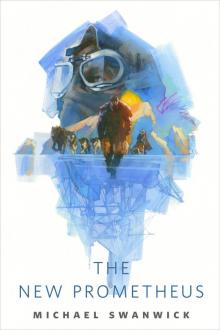 The New Prometheus
The New Prometheus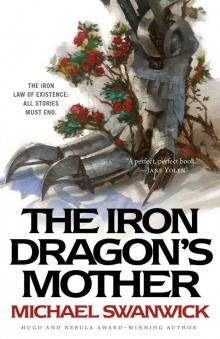 The Iron Dragon’s Mother
The Iron Dragon’s Mother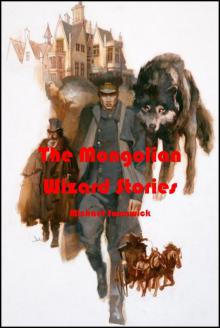 The Mongolian Wizard Stories
The Mongolian Wizard Stories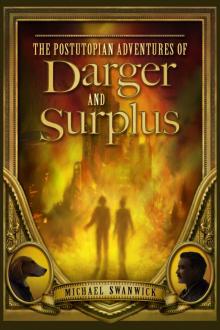 The Postutopian Adventures of Darger and Surplus
The Postutopian Adventures of Darger and Surplus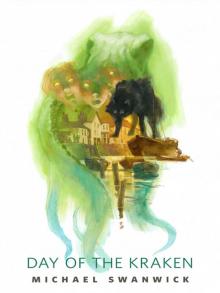 Day of the Kraken
Day of the Kraken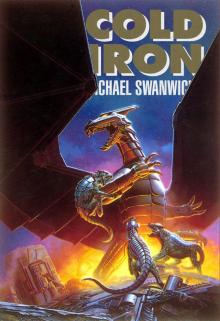 Cold Iron
Cold Iron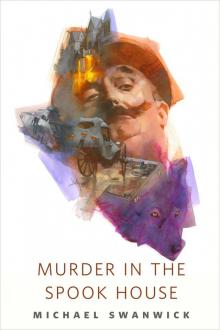 Murder in the Spook House: A Tor.com Original
Murder in the Spook House: A Tor.com Original Radio Waves
Radio Waves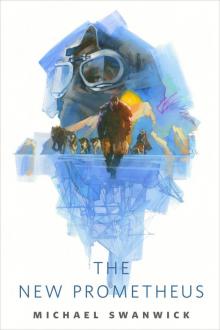 The New Prometheus: A Tor.com Original
The New Prometheus: A Tor.com Original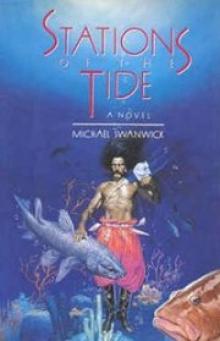 Stations of the Tide
Stations of the Tide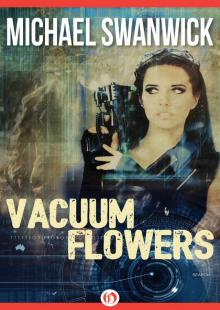 Vacuum Flowers
Vacuum Flowers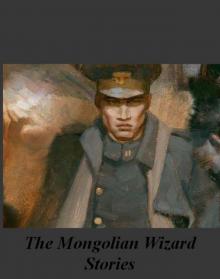 The Mongolian Wizard Stories (online stories 1-7)
The Mongolian Wizard Stories (online stories 1-7)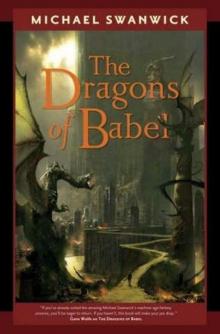 The Dragons of Babel
The Dragons of Babel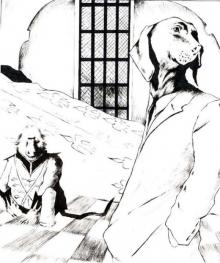 The Dog Said Bow-Wow
The Dog Said Bow-Wow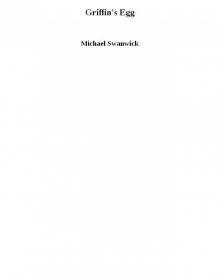 Griffin's Egg
Griffin's Egg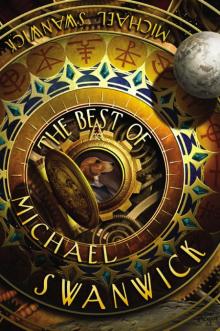 The Best of Michael Swanwick
The Best of Michael Swanwick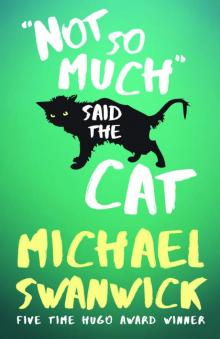 Not So Much, Said the Cat
Not So Much, Said the Cat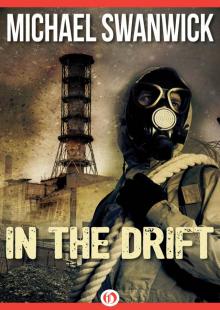 In the Drift
In the Drift Vacumn Flowers
Vacumn Flowers Slow Life
Slow Life The Wisdom Of Old Earth
The Wisdom Of Old Earth Legions In Time
Legions In Time Scherzo with Tyrannosaur
Scherzo with Tyrannosaur The Year's Best Science Fiction (2008 Edition)
The Year's Best Science Fiction (2008 Edition)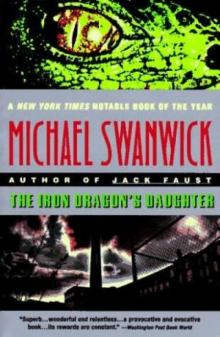 The Iron Dragon's Daughter
The Iron Dragon's Daughter The Very Pulse of the Machine
The Very Pulse of the Machine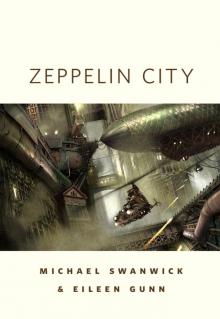 Zeppelin City
Zeppelin City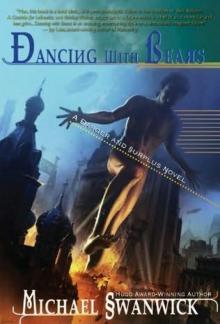 Dancing with Bears
Dancing with Bears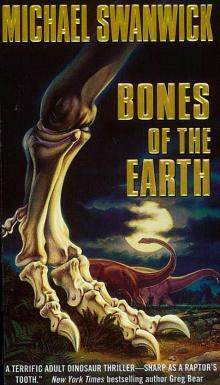 Bones of the Earth
Bones of the Earth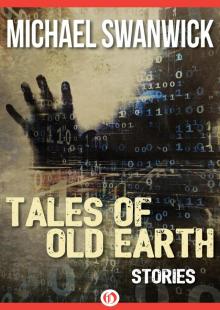 Tales of Old Earth
Tales of Old Earth Trojan Horse
Trojan Horse Radiant Doors
Radiant Doors